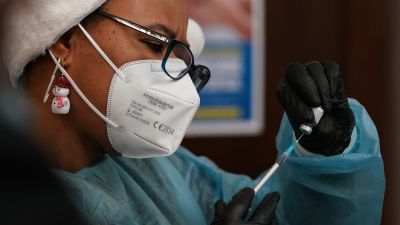No need for second Covid booster vaccine yet, UK health advisors say

There is "no immediate need" for a fourth Covid jab or a second booster dose, the UK's health advisers have said.
New data shows that boosters are 90% effective against admission to hospital from the Omicron variant of coronavirus for the over-65s for up to three months.
The Joint Committee on Vaccination and Immunisation (JCVI) said this means there is "no immediate need" for a second booster dose, or fourth jab, for the most vulnerable people - care home residents and those aged over 80.
The JCVI added this will be kept under review but for now, the focus should be on rolling out the booster doses to all age groups.
With just two vaccine doses, protection against severe disease is around 70% after three months, and 50% after six months - data from the UK Health Security Agency suggests.
Professor Wei Shen Lim, the JCVI’s chair of Covid-19 immunisation, said of the findings of the booster programme: "So that's really really good news. The booster is not only working but it's working for a long period of time."
Asked what happens three months after the booster jab, he said: "We don't know yet because not enough time has passed and we are continuing to review the data and look at the situation with the current Covid wave.
"It may be that people will need another booster dose, which is a second booster dose, but that's certainly not the case at the moment."
Professor Wei Shen Lim speaks about the findings of the booster jab programme and why he doesn't think a fourth jab is needed yet
He said the vaccine provides only "marginal benefit" against people contracting Covid-19 and getting mild symptoms in the long term.
He explained: "So for example, protection against symptomatic disease immediately after a booster it may be about 70%, but it very quickly drops to below 40%, whereas protection against hospitalisation stays above 90% for the entire period."
But he said protection against hospitalisation "has always been the primary aim of the vaccination programme".
Listen to ITV News' podcast - Coronavirus: What you need to know
Speaking about the need for regular Covid jabs in the long term, he said: "I think that might well be the case that we will settle down to a normal programme of immunisation as we do for flu.
"It might be one yearly, it might be a different schedule, I don't think we know.
"But we also don't know whether it will be with a single vaccine or like flu, where you have more than one strain combined in one vaccine dose, we might have double vaccine doses."
Health Secretary Sajid Javid said earlier on Friday there are some "encouraging signs" in the data about the Omicron variant, telling broadcasters that despite it being much more transmissible, it is also "much less severe".
About one in 15 people in England had Covid during the week of Christmas, from 25 December to 31, as the Omicron variant caused a surge in infections.
And NHS hospital trusts across the country have been declaring critical incidents this week in response to huge staff absences caused by coronavirus.
But Mr Javid said the government would be "sticking with" Plan B measures in England "for now".
As of January 2, fewer than 80% of adults in five areas have had a first vaccine dose - according to weekly NHS England estimates published on Thursday: Westminster (73.9%), Camden (74.0%), Islington (78.0%), Nottingham (79.0%) and Coventry (79.9%).
Fewer than half of adults in some of the biggest cities – Liverpool (49.1%), Birmingham (46.9%), Manchester (45.7%) and Nottingham (42.8%) – are estimated to have taken up their third dose.
Newham in London was the area with the lowest take-up of booster and third doses among all adults (38.5%), followed by the London boroughs of Tower Hamlets (38.6%), Barking & Dagenham (39.2%) and Westminster (40.3%).
There are multiple reasons for people not getting vaccinated, including vaccine hesitancy, medical exemptions, and millions who have recently contracted coronavirus will be unable to get a booster until 28 days after their positive test.
As of Thursday, about 61% of the UK population aged 12 and over have received their booster jabs.